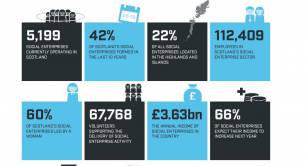"We're not here to replace public sector," says social entrepreneur
What is the point of running a social enterprise? Is it to maintain a healthy balance sheet or should the social impact created be considered more valuable?
This was the interesting question posed by Niall McShannon (pictured above) at the opening evening of the NatWest SE100 Leadership Event 2017 in Edinburgh on 8 March.
Winners of the SE100 Social Business Awards have gathered at the Royal Bank of Scotland headquarters in Gogarburn to hear from several noted speakers on the topic of leadership. This is part of the programme of events for members of the NatWest SE100 Social Business Club which offers insight and peer learning for social entrepreneurs. It is run by Pioneers Post's sister company, Matter&Co.
McShannon is the managing director of Clydesdale Community Initiatives, which teaches construction and landscaping to people with a range of support needs. The social enterprise also delivers construction and landscaping contracts.
We’re not able to replicate lots of what the public sector does
McShannon presented the audience with the kind of graph that most people would never invest in: high on social impact but low (“disastrous”, as McShannon described elements of it himself) on profitability.
He then sketched a picture of some of the challenges of working with both the public sector and the private sector, lamenting the bureaucracy of the former and the inefficiency of the latter.
“The private sector is extremely efficient at making profit but it's not half as efficient as it would like to think it is in terms of delivering projects," he said, before going on to be succinct about the challenges of running his organisation profitably.
"The more pressure that comes on us to generate income through commercial sales the less people with the lower support needs that we can actually engage in that activity."
Despite the challenges that he had encountered with the public sector, McShannon then went on to defend it and issued a warning about the potential for social enterprise. He said: "What we’re able to use social enterprise for is to raise aspirations, raise expectations, increase independence. But we’re not able to replicate lots of what the public sector does."
Perhaps referring to his own organisation's issues with profitability McShannon went on: "We need to be really careful that we’re not used as a bridgehead to champion the privatisation of lots of the public sector that is not going to deliver good value.
"One of the reasons that dealing with the public sector is so difficult at the moment is that it is so demoralised; austerity has stripped all of the joy out of working for the public sector. It has become a concentration of the helpless and the hopeless."
The NatWest SE100 Leadership Event continues today with talks by Tom Rippin of On Purpose and Dr Helen Haugh of the Centre for Social Innovation at Judge Business School at the University of Cambridge. Follow #SE100leaders for details.
Photo credit: Fiona Stuart-Clark



